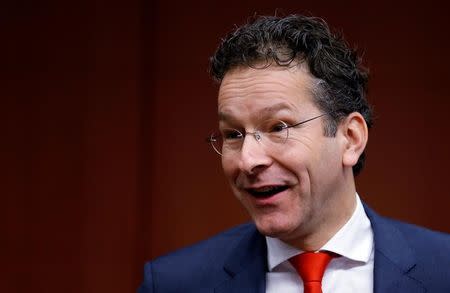Eurogroup's Dijsselbloem rules out Greek bailout deal by Feb. 20

By Toby Sterling and Renee Maltezou AMSTERDAM/ATHENS (Reuters) - Greece and its international lenders are not expected to reach agreement on the country's bailout progress before a meeting of euro zone finance ministers next Monday, Eurogroup President Jeroen Dijsselbloem said on Tuesday. Talks between Athens, its European Union lenders and the International Monetary Fund over labour and energy reforms, fiscal targets and debt relief have dragged on for months rekindling fears of a new crisis in the single-currency bloc. "People think that because there's a Eurogroup next week we have to have it worked out. But that's never been my timeframe. It's unthinkable," Dijsselbloem told Dutch television, adding: "The IMF must also be on board". Athens wants a deal soon to join the European Central Bank's bond-buying programme in March and lure back investors. The EU and the IMF are at odds over the country's fiscal targets and the fund has yet to decide if it will join Greece's third bailout programme. Berlin has made IMF participation a condition for approving new loans. Dijsselbloem said EU and IMF mission chiefs would first need to return to Greece to agree the reforms the leftist-led government should adopt before a deal is approved by euro zone finance ministers. A date has not yet been set for the mission chiefs' return to Athens. With elections this year in the Netherlands, France and Germany, Greece and its lenders have a few weeks to cobble together a deal, which will help Athens stave off a default on bailout loan repayments in July. REVIEW European Commissioner for Economic and Financial Affairs Pierre Moscovici was expected in Athens on Wednesday to help conclude the review. Greek government spokesman Dimitris Tzanakopoulos said Greece would not cave in to demands for more austerity. [A8N1EA00W] "We expect the IMF ... to adopt a more realistic and a more constructive approach in the immediate future," Tzanakopoulos said. "We expect the same from Germany's Finance Ministry."The IMF says it will not participate in Greece's bailout until it has assurances Greece's debt is sustainable. Germany, Europe's paymaster, rejects the idea of granting Greece substantial debt relief. French Prime Minister Bernard Cazeneuve who met Chancellor Angela Merkel said while Greece should pursue reforms, it should not be forced to implement "unbearable" measures. "We support Greece. I reiterated this to the chancellor and I sensed a sincere desire on her part to work towards a solution in which everyone respects their responsibilities," Cazeneuve said. "What is important is that France and Germany work together in order to preserve the integrity of the euro zone." The leader of Greece's main opposition, the centre-right New Democracy party, paid a two-day visit to Berlin, meeting with Merkel and Finance Minister Wolfgang Schaeuble. Kyriakos Mitsotakis, who has been calling for a snap election in Greece, presented his own ideas for economic reform. The talks with Schaeuble on Tuesday were described by officials travelling with Mitsotakis as "very technical and detail-oriented". "As expected Schaeuble was very civil and very tough," an official said. The German Finance Ministry declined to comment on the discussions. (Additional reporting by Noah Barkin in Berlin, Renee Maltezou, George Georgiopoulos, Lefteris Papadimas in Athens; Editing by Janet Lawrence)

